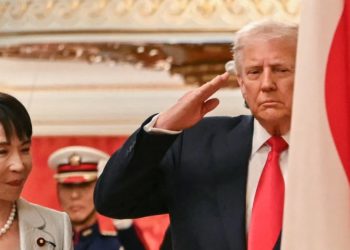In northwest Saudi Arabia near the Red Sea, a planned $5 billion data center would provide enough computing muscle for coders as far away as Europe to build artificial intelligence. On the country’s opposite coast, another planned multibillion-dollar complex could be used by A.I. developers in Asia and Africa.
For generations, Saudi Arabia exported oil. Now it wants to export one of the digital era’s most coveted resources: computing power.
Crown Prince Mohammed bin Salman is seizing a chance to turn Saudi Arabia’s oil wealth into tech influence. Few nations can match the kingdom’s cheap energy, deep pockets and open land — the ingredients that tech firms need to operate the vast, power-hungry data centers that run modern A.I.
Already, Saudi Arabia has been negotiating with American tech giants about using its future data centers and deepening their ties. Executives from OpenAI, Google, Qualcomm, Intel and Oracle are attending the country’s annual Future Investment Initiative conference that begins Monday, nicknamed Davos in the Desert. Next month, Prince Mohammed is scheduled to visit the United States.
One potential deal in the works would provide computing power to Elon Musk’s xAI, said Saeed Al-Dobas, a senior executive at Humain, a new state-backed company coordinating many A.I. projects.
“Amazon was here yesterday. Microsoft we had this morning,” he said in an interview this month, adding that what was being negotiated with Mr. Musk was a “way, way bigger plan.”
Prince Mohammed created Humain in May and wants it to handle about 6 percent of the world’s A.I. workload in the coming years. That could take Saudi Arabia, which handles less than 1 percent now, from bit player to trailing only the United States and China in providing computing power, according to Synergy Research Group, which studies the data center industry.
The kingdom is building three major data center complexes aimed at foreign companies, which could be at least 30 percent cheaper for A.I. work than the United States, Saudi executives said. Construction permits are granted in weeks, and undersea cables and fiber-optic networks put roughly four billion people on three continents within reach of the hubs.
To overcome security concerns in the authoritarian state, Saudi Arabia is also considering “data embassy” zones, where foreign firms could operate under their own national laws rather than Saudi law.
Amazon said it was working with Humain to “accelerate Saudi Arabia’s vision to become a global A.I. leader.” Microsoft declined to comment, and xAI did not respond to requests for comment.
Many are skeptical that Saudi Arabia can deliver. The kingdom has a shallow pool of A.I. expertise. Some warn of a global glut in computing capacity as governments and companies race to build data centers faster than they can profit from them.
“You can never say never, but I can’t imagine any circumstances that would enable Saudi to achieve 6 percent of the world’s A.I. compute capacity,” said John Dinsdale, a senior analyst for Synergy.
As an oil exporter, the kingdom has benefited from collaborating with energy-rich countries through OPEC Plus, the oil-producers cartel. In A.I., no such cooperation exists, and Saudi Arabia trails in a regional race against the United Arab Emirates, which announced a multibillion dollar project with OpenAI in Abu Dhabi this year.
The kingdom’s plans also test a U.S. foreign policy that uses access to advanced A.I. chips to steer nations away from China. During President Trump’s visit to Riyadh in May, American firms like Nvidia were given the go-ahead to sell A.I. chips to Saudi Arabia. But Washington has yet to issue final clearance amid concerns over Riyadh’s ties to Beijing.
Prince Mohammed has been careful not to pick sides in the U.S.-Chinese tussle. The kingdom has deep ties to Mr. Trump — most recently becoming partners with Jared Kushner, his son-in-law, on a $55 billion deal for the video game company Electronic Arts — while welcoming Chinese investment. DeepSeek, the Chinese A.I. company, uses data centers owned by Aramco, the Saudi state oil giant.
At stake is more than just Saudi Arabia’s ability to transform its economy from that of a petrol state. Prince Mohammed wants to use A.I. to wield the same influence that his kingdom has enjoyed from oil.
“It’s easy to say this is just another example of the Saudis’ throwing money at the latest shiny thing, but that could also underestimate the level of ambition,” said Vivek Chilukuri, a senior fellow at the Center for a New American Security. “They won’t get all their goals, but they may get more than many of their critics think.”
The Crown Prince Is Calling
In August 2024, Tareq Amin, an Aramco executive, got a call at 2 a.m. while on a birthday trip in Dubai. “You need to fly back to Riyadh,” he was told.
The caller was an aide for Prince Mohammed, who wanted to meet immediately with business and government leaders to discuss Saudi Arabia’s A.I. strategy, Mr. Amin said. He boarded a flight a few hours later and drove straight to the royal court in Riyadh.
It was not the first time the crown prince had sought an A.I. strategy. In 2019, he established a government agency, the Saudi Data & A.I. Authority, to develop tools like an Arabic chatbot. In 2023, Aramco formed a digital unit to focus on A.I. and other technologies.
After the 2024 meeting, Prince Mohammed started Humain to be the A.I. equivalent of Aramco. Backed by Saudi Arabia’s roughly $1 trillion sovereign wealth fund, Humain combined A.I. initiatives already underway with expansions into new areas. In May, the company said it would build data centers, invest in start-ups and develop A.I. services. Prince Mohammed made himself chairman, and Mr. Amin was appointed chief executive.
“I knew that we were behind in every facet,” Mr. Amin said. “The goal is to create a national entity that is focused on the A.I. total value chain.”
Since then, Humain has announced deals to buy semiconductors from Nvidia, AMD and Qualcomm. It struck a $5 billion deal with Amazon to build A.I. infrastructure. It also released a self-described “helpful and harmless” Arabic chatbot that avoids delicate political and cultural issues, as well as an A.I. laptop and a tool that takes notes during meetings.
Qualcomm said it saw Saudi Arabia as “a digital bridge between continents.” Nvidia said the agreements supported U.S. interests, while AMD said partnering with Humain drove “U.S. leadership in the global A.I. race.”
Human rights concerns, once a deterrent for some companies, have largely faded. Saudi Arabia is betting that tech firms will not be able to resist its cheap electricity, which would make A.I. less expensive to build and deploy.
“If you lower the cost by 20 to 40 percent and offer this to a global market, people will come,” Mr. Amin said.
The kingdom is expanding its electrical grid, and Humain said its sites near Riyadh and Dammam, in the Eastern Province, would deliver 6.6 gigawatts of capacity by 2034, which would require the equivalent of more than six nuclear reactors to power. DataVolt, a company owned by a Saudi industrial conglomerate, is building the data center next to the Red Sea that will be phased in starting in 2028.
“Right now there are two epicenters — the United States of America and China,” said Rajit Nanda, DataVolt’s chief executive. “There’s room for someone to be the third epicenter and the fourth epicenter.”
The U.S.-China Dance
Saudi Arabia’s plans could be derailed by one major hurdle: U.S.-made A.I. semiconductors, which power data centers but are scarce and difficult to obtain.
To get the components, Saudi Arabia needs Mr. Trump’s support. This year, as Saudi officials prepared for Mr. Trump’s trip to the Persian Gulf, they participated in talks in Washington to broker purchases of A.I. chips.
In the meetings, U.S. officials worried that Saudi Arabia was not taking their concerns about security threats from China seriously enough, two people with knowledge of the negotiations said.
At one point, Saudi officials questioned why they should commit to U.S. export control rules that would limit how the chips could be used. They also proposed housing Chinese chips in areas of data center complexes different from those of U.S. chipmakers like Nvidia, three people with knowledge of the talks said.
When Mr. Trump visited Riyadh in May, Humain was given a preliminary go-ahead to buy 18,000 A.I. chips from Nvidia, with more to follow. DataVolt would receive a different allotment. Yet five months later, the final sales have not been approved.
Saudi Arabia is in limbo along with other gulf countries. The Emirates appeared on track for its allotment of A.I. chips after recently announcing plans to move forward with a data center with OpenAI. Last year, the Emirati company G42, which is involved in the project, agreed to pull technology from the Chinese tech company Huawei in exchange for A.I. chips.
The White House’s Office of Science and Technology Policy and the Commerce Department did not respond to requests for comment.
Humain and DataVolt said they would not allow Chinese companies to use their data centers. But ties between China and Saudi Arabia have deepened since at least 2019, when Chinese firms helped upgrade the kingdom’s telecommunications network. In February, DeepSeek agreed to use Aramco data centers. An investment firm partly owned by Aramco has invested in a prominent Chinese A.I. company, ZhipuAI.
Chinese researchers with ties to Chinese military-linked universities have access to a powerful A.I. computer at Saudi Arabia’s King Abdullah University of Science and Technology.
Some U.S. officials argue it is best to have American technology compete against Chinese technology without security constraints. If so, Saudi Arabia could be one of the first countries where major American and Chinese A.I. infrastructure exist, and compete, side by side.
On Riyadh’s outskirts this month, construction crews flattened a patch of land that would be a data center for DataVolt. Trenches were being prepared for networking cables and electrical connections. On the other side of a security fence, Amazon was completing another facility.
“Everyone is investing,” said Hani Rabi, a manager for the Saudi construction firm Comatec. “It’s booming.”
Vivian Nereim contributed reporting from Riyadh.
Adam Satariano is a technology correspondent for The Times, based in London.
Paul Mozur is the global technology correspondent for The Times, based in Taipei. Previously he wrote about technology and politics in Asia from Hong Kong, Shanghai and Seoul.
The post Saudi Arabia, Rich With Oil, Wants to Be Known as the A.I. Exporter appeared first on New York Times.




